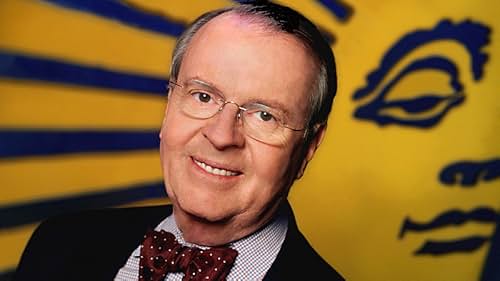Charles Bishop Kuralt (September 10, 1934[1] – July 4, 1997) was an American television, newspaper and radio journalist and author.[2][3] He is most widely known for his long career with CBS, first for his “On the Road” segments on The CBS Evening News with Walter Cronkite, and later as the first anchor of CBS News Sunday Morning, a position he held for fifteen years.[4] In 1996, Kuralt was inducted into Television Hall of Fame of the National Academy of Television Arts & Sciences.[5]
Kuralt’s On the Road segments were recognized twice with personal Peabody Awards.[6][7] The first, awarded in 1968, cited those segments as heartwarming and “nostalgic vignettes.”[6] In 1975, his award was for his work as a U.S. “bicentennial historian”; his work “capture[d] the individuality of the people, the dynamic growth inherent in the area, and…the rich heritage of this great nation.”[7] Kuralt also won an Emmy Award for On the Road in 1978.[5] He shared in a third Peabody awarded to CBS News Sunday Morning in 1979.[8]
Kuralt was born in Wilmington, North Carolina.[2] His father, Wallace H. Kuralt Sr. was a social worker and his mother, Ina Bishop, was a teacher.[3] In 1945, the family moved to Charlotte, North Carolina where his father became Director of Public Welfare in Mecklenburg County.[9][10] Their house off Sharon Road, then 10 miles south of the city, was the only structure in the area.[11][12][13]
As a boy, he won a children’s sports writing contest for a local newspaper by writing about a dog that got loose on the field during a baseball game. When he was 14 years old, Kuralt became one of the youngest radio announcers in the country, covering minor-league baseball games and hosting a music show.[4] In 1948, he was named one of four National Voice of Democracy winners at age 14, where he won a $500 scholarship. Later, at Charlotte’s Central High School, Kuralt was voted “Most Likely to Succeed” in his graduating class of 1951.[12]
He attended the University of North Carolina at Chapel Hill. There, he joined the literary fraternity St. Anthony Hall. He also became editor of The Daily Tar Heel and worked for WUNC radio.[2] He also had a starring role in a radio program called American Adventure: A Study of Man in The New World in the episode titled “Hearth Fire”, which aired on August 4, 1955. It is a telling of the advent of TVA‘s building lakes written by John Ehle and directed by John Clayton. During the summer, he also worked at WBTV in Charlotte.[10] He graduated from UNC in 1955 with a degree in history.[3][4]
After graduating from UNC, Kuralt worked as a reporter for the Charlotte News.[2] He wrote “Charles Kuralt’s People,” a column that won an Ernie Pyle Award in 1956.[3][10] He moved to CBS in 1957 as a writer.[2] When he was 25 years old, he became the youngest correspondent in the history of CBS News. He became the first host of the primetime series Eyewitness to History in 1960.[4] He also covered the 1960 presidential election.[3] Variety said, “Kuralt’s a comer. Young, good looking, full of poise and command, deep voiced and yet relaxed and not over-dramatic, he imparts a sense of authority and reliability to his task.”[10]
In 1961, he became CBS’s Chief Latin American Correspondent, covering 23 countries from a base in Rio de Janeiro, Brazil.[14][3][4] In 1963, he became the Chief West Coast Correspondent, moving to Los Angeles.[15][14] The next year, he returned to New York City and the CBS News headquarters.[14] Starting in 1961, he did four tours in Vietnam during the war.[3][4][16] Kuralt said, “”Every time I got sent to Vietnam I seemed to get into some terrible situation without really trying too hard. In 1961, we got the first combat footage of that stage of the war. It was before the U.S. was involved with troops in the field, but we went out with the Vietnamese Rangers and got ambushed. Half the company we were with got killed. We were lucky as hell not to get killed “[16]
He also covered the revolution in the Congo (now Democratic Republic of the Congo).[3][4][16] In 1967, Kuralt and a CBS camera crew spent eight weeks with Ralph Plaisted in his first attempt to reach the North Pole by snowmobile, which resulted in the documentary To the Top of the World and his book of the same name.[16]
Kuralt was said to have tired of what he considered the excessive rivalry between reporters on the hard news beats.[17] He said, “I didn’t like the competitiveness or the deadline pressure,” he told the Academy of Television Arts & Sciences, upon his induction into their Hall of Fame. “I was sure that Dick Valeriani of NBC was sneaking around behind my back—and of course, he was!—getting stories that would make me look bad the next day. Even though I covered news for a long time, I was always hoping I could get back to something like my little column on the Charlotte News.”
